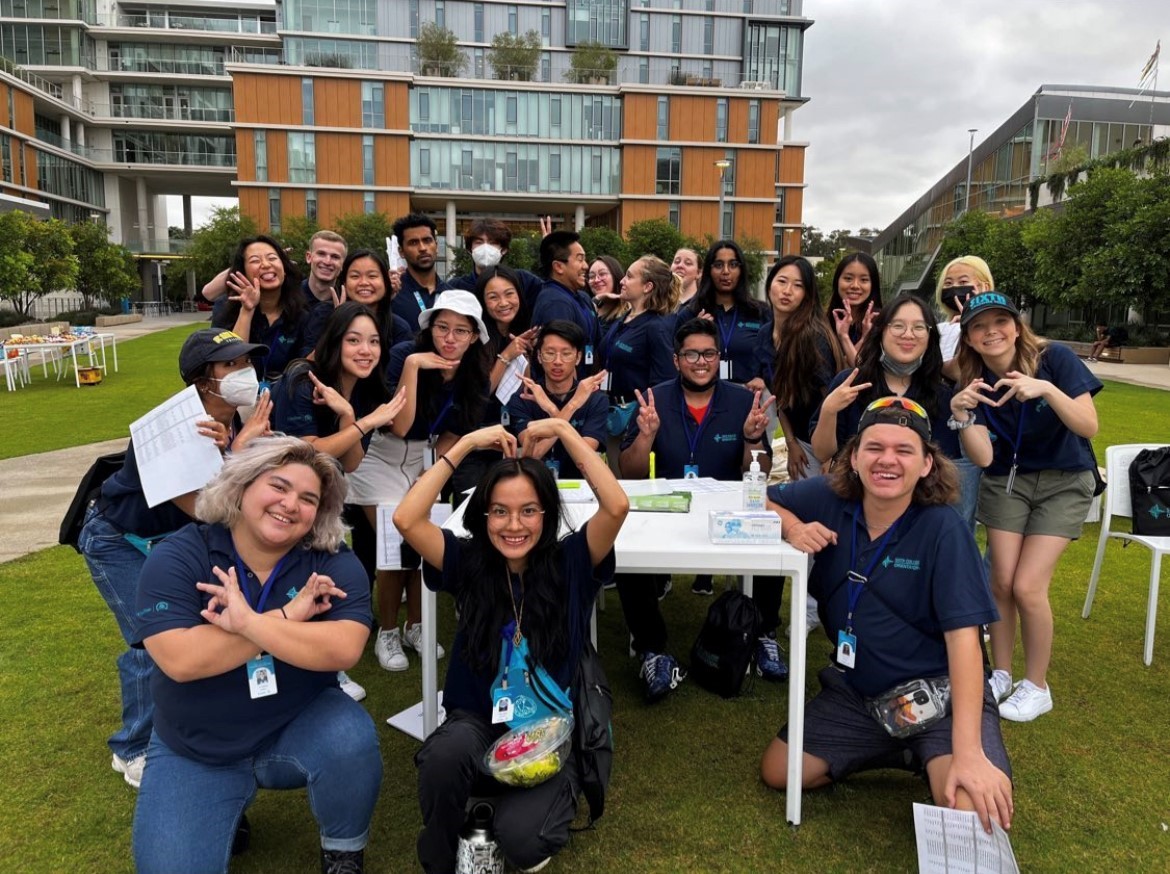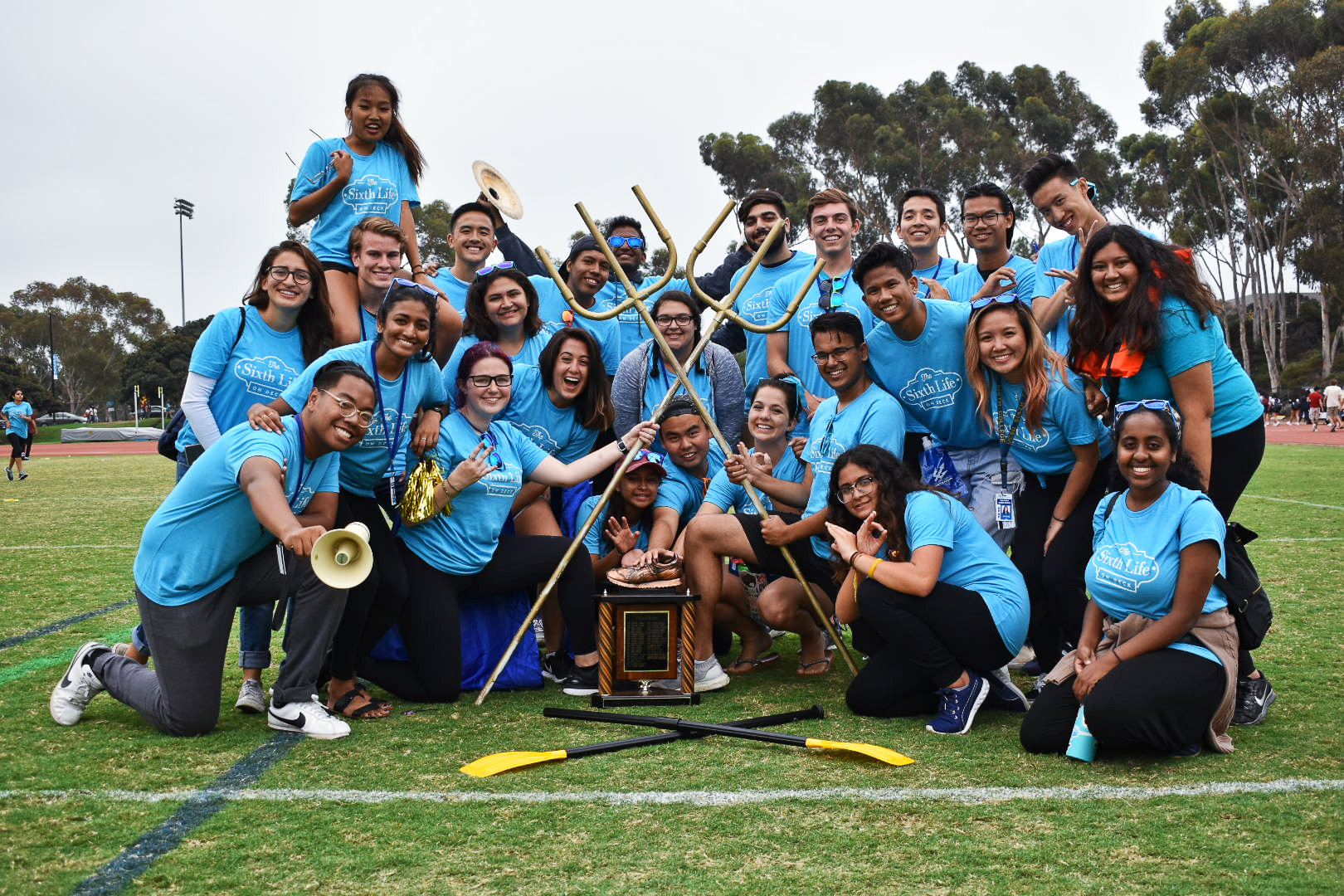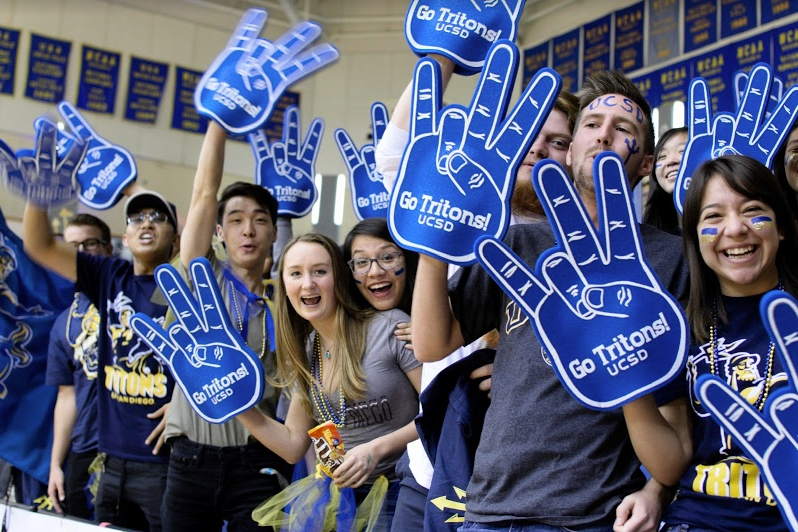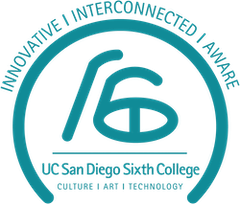Sixth College Parent and Family Orientation
We are excited to welcome you to the Sixth College family and to our beautiful campus community. Navigating the transition to university life can be challenging, regardless of any prior experience. Our goal is to provide you with valuable and easy to understand information to aid in the transition process.
We have pulled together information that will help you be successful in supporting your Triton & Sixer. Reviewing this information will help you to understand many of the processes, resources, and opportunities at UC San Diego and Sixth College.

About Sixth
INNOVATIVE – INTERCONNECTED – AWARE
Established in September 2001, Sixth College seeks to create student-scholars that are dynamic, cutting-edge, and well-versed in modern technology. The mission of Sixth College is to prepare our students to become dynamic citizens of the 21st century and to be confident in generating cutting edge, boundary breaking ideas and innovative technology. We emphasize and facilitate an immersive experiential learning approach and hope students will take the fullest advantage of the opportunities we constantly strive to place before them.
The official color of Sixth College is teal, and we show our Sixer pride on Tuesdays by wearing teal and/or Sixth swag! We hope you'll join us in representing Sixth on campus and in the UC San Diego community!

Student Affairs
Each college has a dedicated team of professionals who are eager to help students make connections and support their success and well-being at UC San Diego. Sixth College has a rich student life, with countless activities, student run organizations, and services designed to help new students make friends, experience new challenges, and expand their horizons.
Experience Student Life
Did you know that students who get involved on campus actually perform better in school? It’s true. When students get involved, they create their own student experience and their confidence grows as they practice and develop skills in interpersonal communication, time management, conflict resolution, and group dynamics. Plus, having a list of involvement experiences will look great on their resume!
Sixth College’s small campus makes it easier for students to feel like a part of the community. It doesn’t hurt that we also offer many opportunities for student involvement, organizations, and even employment opportunities right here at their home away from home. Check our involvement opportunities here.
The Co-Curricular Record (CCR)
The co-curriculum refers to activities and learning experiences that occur outside of the classroom, but also help to complement and advance the students’ learning and skills that make them marketable after graduation. In short, it is the professional development that happens through involvement and leadership.
We are fortunate at UC San Diego to have one of the country’s only official University-recognized Co-Curricular Record (CCR) documents. UC San Diego has developed the Co-Curricular Record to recognize student involvement in the following areas:
- Research and Academic Life
- Student and Campus Engagement
- Community-Based and Global Learning
- Professional and Career Development
The purpose of the CCR is to demonstrate the value of engaging in opportunities beyond the classroom, and to help students reflect on and articulate the competencies and skills they developed.
Student Affairs Office
Beyond helping students find ways to get involved, staff in Sixth Student Affairs also provide personal support during challenging periods in a student’s academic career. From providing personal support through the academic integrity and student conduct processes, advocating for students, and supporting health and well-being, students can find resources and assistance in the Student Affairs office.
The Student Affairs office is also a resource for parents who need help supporting students. We’re here to help you navigate all that Sixth College and UC San Diego have to offer.
There are so many opportunities for your student to hone their leadership skills and contribute to the entire Triton community. Encourage your student to get involved! They'll be glad they did!
University Living
UC San Diego provides a vibrant student experience. Sixth College creates a community of friends and neighbors. We understand that environment and routine have a direct impact on your student’s overall well-being and success. Whether they live on campus or commute, UC San Diego will become their home away from home for this chapter of their life.
Residential Students
The Residential Life Office is a resource that provides transitional support and fosters personal growth. Professional staff support the community through education and engagement. They work with the residential student staff, who serve as resources within the residential community and live alongside students. They assist with providing a safe and comfortable living environment, facilitating roommate agreement conversations, and hosting programs that enhance the educational experience and encourage dialogue.
At UC San Diego, you get to learn where you live - in one of our diverse residential neighborhoods. Get to know our 4 residential buildings here.
Sixth College is also home to four Living-Learning Communities (LLCs) including the Multicultural, African Black Diaspora, Gender Inclusive Housing, and OASIS Summer Bridge LLCs. These types of living environments on college campuses are associated with higher GPAs, deeper learning, increased retention rates, and increased graduation rates.
Visit the Housing Dining Hospitality (HDH) website for information on the housing timeline, process, current rates, services and deadlines. There’s even a newsletter for parents and families, to help them stay up with the latest housing information.
Commuter Students
Commuter students are important and valued members of UC San Diego and are welcomed in the Sixth College community. If your student is planning to live off campus, there are plenty of useful resources, tips and study spaces designed especially for you. Some of these resources include commuter lockers and refrigerators, commuter lounges, and commuter student organizations at both Sixth College and campus-wide!
UC San Diego offers support for students in finding off-campus housing online here. Need help understanding a rental agreement? Student Legal Services can help with counseling services and critical information for renters. They can even review lease agreements before students sign them–a free service to registered students! Visit their website here.
Dining Dollars and Triton Cash
All campus housing contracts include a dining plan. This helps students access meals right where they live (or adjacent to that 8:00 am class if they prefer)! You and your student can choose the amount of Dining Dollars they’ll have in their plan. The entire balance is available at move-in, so you may want to talk with your student about a plan to budget throughout the year. Meal plans are designed to be low cost and flexible; therefore they do not support 3 meals per day, 7 days per week.
Dining Dollars are linked to your student’s campus ID card, and can be used at all Dining Services restaurants and markets. Each purchase is automatically deducted from their account balance--like a bank debit card. Residents can add Dining Dollars to their plan online throughout the year.
Triton Cash is the University’s pre-paid spending account and is linked directly to your student’s campus ID card. This makes it easy to purchase items on campus without having to carry cash. Triton Cash is available to all students (on campus residents and commuters), staff, faculty and even visitors.
Transportation and Parking
Once students are here, getting around campus and to local destinations is easy and in many cases, has already been paid for by student fees. Parking, on the other hand, is always in high demand and can be a little tricky.
First year students can purchase daily parking permits and summer session parking permits only. Here are some options that may be helpful to your student: public transit, campus shuttles, cycling, ridesharing, and Zipcar car sharing. If you need assistance in finding the best transportation alternatives to meet your needs, contact Commute Solutions.
If your student has a disability or medical condition that requires access to a personal vehicle while at UC San Diego, they can apply for a Disabled Person parking placard or license plate from your home state or from the California Department of Motor Vehicles. If they have a Disabled Person placard or license plate, they may park in accessible spaces on campus without displaying a parking permit. Students needing additional accommodations to access university programs and services must register with the Office for Students with Disabilities.
Programs
Whether your student is living on or off campus, Sixth College hosts community-building programs for the entire student body. Bringing people together is the first step to building community, right? Ask your student about their experience at some of these events and stay engaged in their campus experience.
We don’t leave you out of the FUN! Sixth College works in collaboration with Parent & Family Programs to host events that help keep parents, guardians, and families engaged in the Triton community! We hope you will join us for community events including Homecoming, Family Weekend, and Siblings Day!
Academic Experience
UC San Diego offers a unique academic experience, a stellar faculty, programs with high national rankings and a vibrant co-curriculum. Our fast-paced quarter system gives students more class choices, and a greater breadth of interdisciplinary knowledge.
Our college system sits at the heart of the UC San Diego experience. The college system allows Sixth College to provide a small-college feel where students will share academic experiences with peers, and have a home base where they can get to know and work with professional staff dedicated to their success.
Student Rights and Responsibilities
The information below is helpful for you to be aware of so you can support your student and talk with them about the policies and their responsibilities.
Students that choose to become a member of the UC San Diego community affirm their commitment to excel with integrity because there can be no academic excellence without it. Integrity means having the courage to be honest, trustworthy, fair, respectful, and responsible, even when it is difficult.
It is critical that students avoid taking part in activity that involves attempting to receive a grade by means other than honest effort. Allowable forms of study aids and policies on working in groups can vary from course to course, and instructors will not verbalize every unauthorized behavior. The class syllabus is a good resource for students, but it is encouraged that students clarify academic expectations with their professor if they are unclear. Faculty and instructional assistants are available during class and office hours. The Academic Integrity Office provides information and training resources for students.
At UC San Diego, student conduct is a fair and educational process that aims to facilitate student growth and development while maintaining the integrity of our community. We value fairness, education, accountability, restorative practices, growth, and development and collaboration. Students are expected to understand and uphold the Student Code of Conduct and staff in the Office of Student Conduct, the College’s Dean of Student Affairs Office, and Residential Life Office are available to students if they have questions about the code, their rights, or the resolution process.
College Requirements
The first college resource that will support your student’s academic success will be Academic Advising. Advisors are here to help your student navigate their academic journey at UC San Diego and Sixth College. Sixth College advisors help your student determine their General Education requirements, as well as their overall degree pursuit. Your student will also receive assistance from their Major Department. Other advising resources can be found through International Student Advisors, Career Counselors, and Academic Internship Advisors.
At Sixth College, the guiding philosophy and college theme, Culture, Art, and Technology, serve as the basis for our general education requirements which encourage exposure to fields outside of a student’s major discipline and to ensure depth and breadth of study. Students must complete the following in addition to the University requirements.
There is a set list of General Education requirements for incoming first-year students, which can be found here: First Year GE Requirements
General Education requirements differ based on the type of transfer agreement students arrive with. Check the Transfer GE Requirements for more information. Regardless of transfer type, students are responsible for completing a Practicum course and CAT 125.
TritonLink is the website all current UC San Diego students use to access a host of useful and important tools and resources. Everyone has access to TritonLink at students.ucsd.edu or tritonlink.ucsd.edu, and no login is required.
The Family Educational Rights and Privacy Act (FERPA)
Students also have the right to expect confidentiality when it comes to their educational records. The Family Educational Rights and Privacy Act (FERPA) provides that protection.
The Family Educational Rights and Privacy Act (FERPA) is a federal law enacted in 1974 that protects the privacy of student education records. FERPA applies to any school that receives funds under an applicable program of the US Department of Education. FERPA prohibits educational institutions from disclosing “personally identifiable information in education records” without the written consent of an eligible student. An eligible student is one who has reached age 18 or attends a school beyond the high school level.
So how do parents and families obtain information about their student’s education and conduct record? The obvious answer is to ask your student for updates, but that may not always be convenient or possible. If you contact Sixth College for information about your student, know that we will not be able to provide information to you without the written consent of your student. FERPA waivers can be obtained in the relevant offices. Waivers are not transferable and will need to be filled out by the student per office.
Academic Resources
Office of Academic Support and Instructional Services (OASIS)
- As the Educational Opportunity Program (EOP) of UC San Diego, OASIS facilitates the intellectual and personal development of students, with a particular focus on students who are first-generation, high financial need, and/or are underserved. Through a challenging and supportive environment, that emphasizes collaboration, validation, equity, and social justice, OASIS contributes positively to students’ learning, persistence, achievement, and empowerment.
The Teaching + Learning Commons
- Made up of six unique, but integrated hubs, The Teaching + Learning Commons provides comprehensive academic support for students. Services provided by the Academic Achievement, Experiential Learning, and Writing Hubs empower students to take control of their education, helping them to develop essential skills for learning across disciplines and enabling them to achieve their full potential. Services include peer-led content tutoring and study groups.
The Writing Hub
- The Writing Hub, a unit within the Teaching + Learning Commons, supports all writers on campus—every writer, any project—and promotes writing as a tool for learning.
IDEA Engineering Student Center
- The IDEA Engineering Student Center vision is to foster an inclusive and welcoming community, increase retention and graduation rates, and promote a sustainable culture of academic excellence among all engineering students.
Tutoring
- Many academic departments offer support customized to their course offerings.
Research Experience and Applied Learning (REAL) Portal
- An online resource that provides opportunities where students are “learning by doing” and practicing their classroom knowledge in real-world settings.
Academic Enrichment Programs (AEP)
- AEP sponsors several scholarships, programs, and opportunities for students to get involved in research on and off campus.
The Academic Internship Program (AIP)
- Students have the opportunity to receive lower-division or upper-division course credit for supervised placement in a work setting.
Learning Strategies Workshops
- Learning Strategies Tutoring provides an opportunity for students to develop skills that address learning challenges (examples: defining study goals and developing time management skills) while teaching the underlying metacognitive conditions (such as growth mindset vs. fixed mindset) that can contribute to these challenges.
University 101
Part of the transition to the UC San Diego family is becoming familiar with a few technical terms that your student may use. If you are not fully sure what they are saying, here are some answers to frequently asked questions to help you on your way.
Syllabus
- A syllabus is a guide that a professor or instructor makes to outline course expectations, policies, rules and regulations, required texts, and a schedule of assignments. Students usually receive the syllabus on the first day of classes, although it can sometimes also be found online or sent prior to the first day of instruction. It is important for students to read their syllabi! If a student is unclear about something regarding their classes, encourage them to read through their syllabi.
Office Hours
- Professors and instructors reserve time to talk with students outside of class, while not always in their office; these opportunities are announced in class and on the syllabus. Some instructors want students to make an appointment and some allow drop in conversation. Again, this will be communicated either in class or on the syllabus. Instructors often expect students to connect with them outside of the classroom. Though it may be daunting, encourage your student to go to office hours to get to know their instructors and get questions answered.
Lecture vs. Section
- A course often includes a lecture and a section component. An instructor who introduces and teaches the course content to all students enrolled in the class facilitates lectures. Sections are small group student discussions where students discuss the concepts and materials from lecture. Additional coursework may be required for sections.
Undeclared
- Academically speaking, undeclared simply means students have not made up their mind about a major area of study. Many first-year students begin college without “declaring” a major. College, major and career advisors are available for consultation and guidance as you make a decision. Students need to declare a major by the time they earn 90 units.
Capped Majors
- Capped majors are majors with limited enrollment. Acceptance into a capped major is not guaranteed if a student was not admitted to UC San Diego in the capped major.
Double Major
- In certain situations, students are allowed to declare more than one major area of study if they meet the program and university requirements of two majors. If a student meets the program and university requirements, students are allowed to declare more than one major area of study. There is a university process by which students are granted approval.
Minor
- A minor is a set of courses within a well-defined subject that serves as a secondary area of academic focus. It is very common for students to declare both a major and a minor. Many academic departments and programs offer minors.
Next Steps
Everyone at UC San Diego and Sixth College is invested in the success of your student. We are proud to be a student-centered, research-focused, service-oriented public research university that can offer a personalized approach. Students may face challenges, but they will never be on their own as a Triton. Encourage them to take advantage of every opportunity that UC San Diego has to offer!

Parent and Family Orientation Sessions
Since our New Student Orientation is designed for new students only, we offer a separate series of orientations for parents and families. We offer our Parent and Family Orientation completely online and free of cost. While it is not mandatory, it is highly recommended.
The Undergraduate Colleges, in partnership with the Office of Parent and Family Programs, invite you to a series of orientation webinars specifically for parents and family members of new Tritons. Topics include: student health and well-being, financial aid and scholarships, career center, study abroad, housing, and more. These webinars typically take place in August and September.
More information will be updated here and sent to you in our Parent and Family newsletters over the summer!
